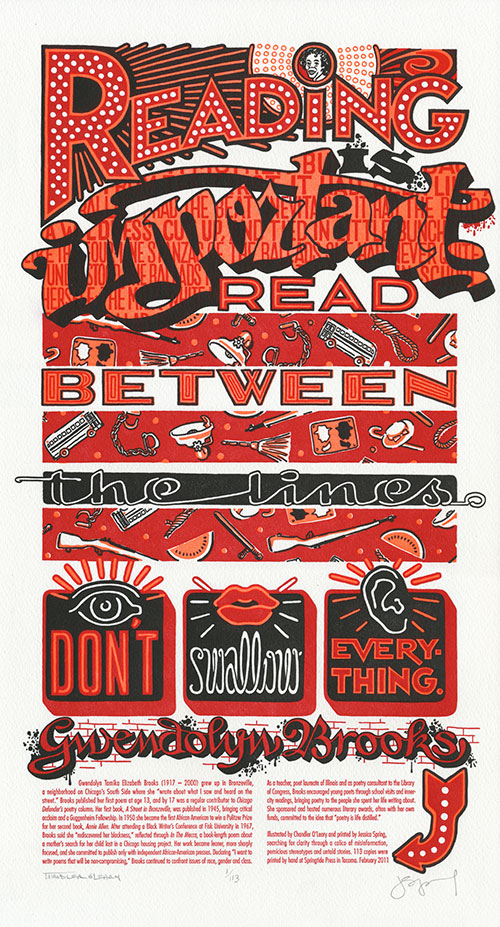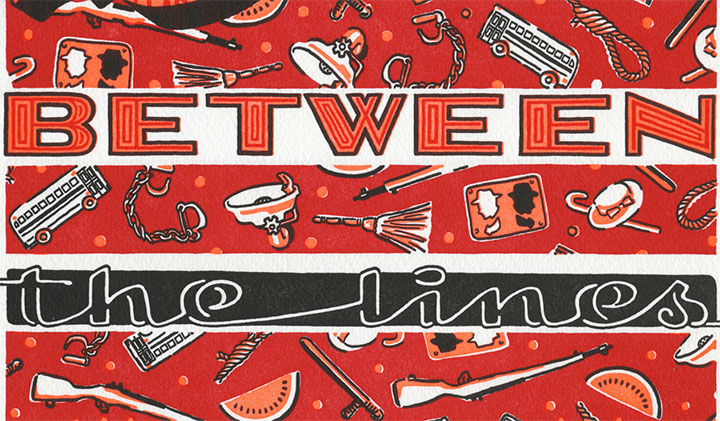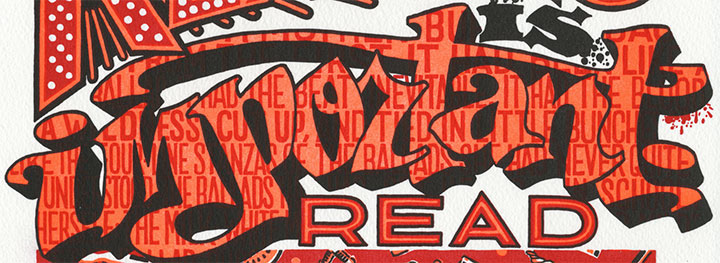Warning Signs

In honor of Black History Month, and of the might of the written word, our newest Dead Feminist is powerhouse poet Gwendolyn Brooks. Without further ado, I’ll hand over my pen to her:
Reading is important. Read between the lines. Don’t swallow everything.
I guess we’re done with the knitting needles and home canning for now; time to don the boxing gloves. This was a tough one, and we almost didn’t have the gall to go through with it. But Gwendolyn Brooks was never one to pull a punch; she faced and shed light on the most uncomfortable truths with bravery and eloquence. And there seem to be an awful lot of uncomfortable truths floating around lately; like a certain congressperson’s assertion that our nation’s founding fathers ended slavery, or the fact that no matter how many African American Presidents we elect, racism isn’t dead. (Don’t believe me? Even my most cursory historical research brought up all sorts of fresh, modern hatred. Try it for yourself and do an online image search for “watermelon stereotype”—if you can stomach it. Just keep an airsick bag handy, because it ain’t pretty.)
So in tribute to Brooks’s courage, Warning Signs is a riot of color and fluorescent ink, glowing like an urban beacon. Flashing neon and spattered graffiti confront us, sounding the alarm with every word. Beneath the fluorescent current runs a blood-red repeating calico pattern of violence and cruelty—a tapestry that forms the unfortunate warp to the weft of our past and present.
And as an undercurrent to the undercurrent, behind the graffiti reads the first stanza of Brooks’s poem, “A Bronzeville Mother Loiters in Mississippi. Meanwhile, a Mississippi Mother Burns Bacon.” The poem grapples with the brutal 1955 murder of 14-year-old Emmett Till, and weaves a tale of remorse and confusion from the perspective of Carolyn Bryant, the white woman whose accusations that Till flirted with her provoked her husband to abduct and kill the boy. But we didn’t choose the poem for its subject matter, per se—we chose it for the articulate beauty with which Brooks tells the story. It’s still a punch to the gut, but when she knocks you flat you see some awfully pretty stars.
A portion of the proceeds from Warning Signs will be donated to 826CHI, a non-profit Chicago writing and tutoring center. 826CHI is dedicated to supporting the writing skills of students ages 6 to 18, and to helping teachers inspire their students to write—their mission is to “strengthen each student’s power to express ideas effectively, creatively, confidently, and in his or her individual voice.” We think Ms. Brooks would approve.
• • • • • • • • • • • • • • • • • • • • • • • • • • • • • • • • • • • • • • • • • • • • • • • • • • • • • • • • • • • •
Warning Signs: No. 11 in the Dead Feminists series
Edition size: 113
Poster size: 10 x 18 inches
Printed on an antique Vandercook Universal One press, on archival, 100% rag paper. Each piece is numbered and signed by both artists.
Colophon reads:
Gwendolyn Tamika Elizabeth Brooks (1917 – 2000) grew up in Bronzeville, a neighborhood on Chicago’s South Side where she “wrote about what I saw and heard on the street.” Brooks published her first poem at age 13, and by 17 was a regular contributor to Chicago Defender’s poetry column. Her first book, A Street in Bronzeville, was published in 1945, bringing critical acclaim and a Guggenheim Fellowship. In 1950 she became the first African American to win a Pulitzer Prize for her second book, Annie Allen. After attending a Black Writer’s Conference at Fisk University in 1967, Brooks said she “rediscovered her blackness,” reflected through In The Mecca, a book-length poem about a mother’s search for her child lost in a Chicago housing project. Her work became leaner, more sharply focused, and she committed to publish only with independent African-American presses. Declaring “I want to write poems that will be non-compromising,” Brooks continued to confront issues of race, gender and class.
As a teacher, poet laureate of Illinois and as poetry consultant to the Library of Congress, Brooks encouraged young poets through school visits and inner-city readings, bringing poetry to the people she spent her life writing about. She sponsored and hosted numerous literary awards, often with her own funds, committed to the idea that “poetry is life distilled.”
UPDATE: poster is sold out. Reproduction postcards available in the Dead Feminists shop!
![Chandler O'Leary [logo]](https://chandleroleary.com/wp-content/themes/chandleroleary/images/logo.png)



